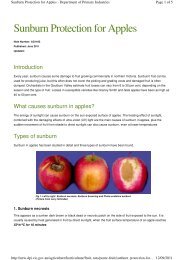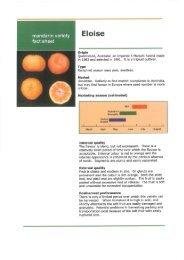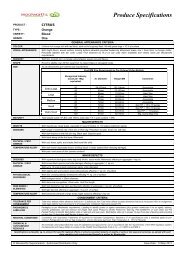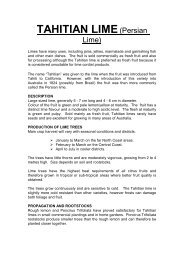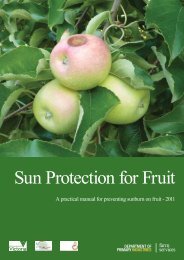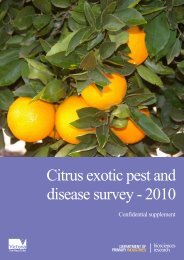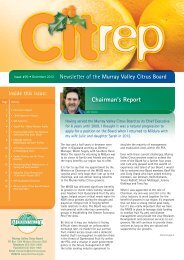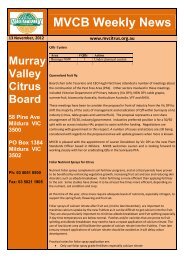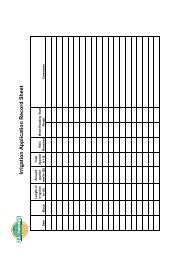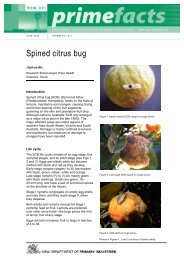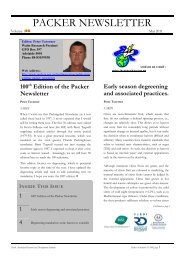ANNUAL REPORT 2005 - MVCB - Murray Valley Citrus Board
ANNUAL REPORT 2005 - MVCB - Murray Valley Citrus Board
ANNUAL REPORT 2005 - MVCB - Murray Valley Citrus Board
You also want an ePaper? Increase the reach of your titles
YUMPU automatically turns print PDFs into web optimized ePapers that Google loves.
During 2004/05 more than $60,000 was spent on preparing long term sponsorship and business<br />
plans and directly sponsoring these programs. A feature of these programs is to more closely<br />
involve retailers.<br />
Other promotional activities the MCC has been involved in during the year include the Spring<br />
Harvest Picnic at Werribee, the Harvest Picnic at Hanging Rock and in-store demonstrations at<br />
The Glen Shopping Centre. At these events many wholesaler members have for the first time<br />
come into direct contact with consumers. This experience has been an eye opener to them,<br />
particularly in regard to consumers’ expectations of the product.<br />
Research and Development<br />
1. Optimising citrus fruit size by regulating flower numbers and crop load<br />
This project is a <strong>MVCB</strong> Voluntary Contribution-funded project (in collaboration with<br />
CSIRO) through Horticulture Australia Ltd - CT03031. The primary aim of this project is<br />
to develop a gene-based “citrus floral index” that can be used to predict flowering and<br />
allow more effective use of winter GA sprays.<br />
2. The physiology of post harvest rind breakdown in Navel oranges<br />
This project is a <strong>MVCB</strong> Voluntary Contribution-funded project (in collaboration with<br />
CSIRO) through Horticulture Australia Ltd - CT01026. The primary aim of this project is<br />
to determine the physiological processes occurring during low temperature storage and the<br />
development of chilling-related rind breakdown in Navel oranges.<br />
3. Optimising the quality of citrus for Asia markets<br />
The aim is to assess postharvest techniques to optimize the quality of citrus for Asian<br />
markets including use of the “Moisture Control Technology” fruit carton liners.<br />
4. Irrigation management of new citrus varieties<br />
Irrigation scheduling is an increasingly important management practice for citrus growers.<br />
Irrigation management influences canopy growth, flowering, fruit set, fruit size, and<br />
ultimately grower returns. Different citrus varieties can require individual irrigation<br />
management strategies and this project aimed to study the water requirements of Navelina,<br />
a widely planted new early season Navel variety.<br />
The study showed that small trees have significantly lower irrigation requirements than<br />
mature sized trees. Anecdotal evidence of this has been presented throughout the<br />
Sunraysia district in recent seasons.<br />
The project was completed in September, 2004.<br />
Market Access<br />
<strong>MVCB</strong> representatives attended seminars to test the guidelines of Horticulture for Tomorrow<br />
Environmental Assurance Project during the year and hosted two overseas delegations, one from<br />
Taiwan in November 2004 and one from China in July 2004.<br />
The <strong>MVCB</strong> also had the following meetings in a continued effort to improve market access:<br />
Mark Vaile, Federal Minister for Trade, regarding access to China (December 2004);<br />
Warren Truss, Federal Minister for Agriculture, regarding access to China and fruit fly<br />
issues (January <strong>2005</strong>);<br />
Peter Batchelor, State Minister for Major Projects, regarding proposed waste containment<br />
facility affecting our clean, green image (December 2004);<br />
Horticulture Australia Limited regarding Export Efficiency Powers;<br />
Richard Bull regarding report published on managing fruit fly in NSW (December 2004).<br />
Tri State Fruit Fly – Area Freedom<br />
The <strong>MVCB</strong> continues to support the Tri-State Fruit Fly program by contributing $35,000 during<br />
the 2004/<strong>2005</strong> year and having a representative on the Tri-State Fruit Fly Committee. The aim of<br />
the program is to stimulate public awareness about the Fruit Fly Exclusion Zone (FFEZ) and is<br />
targeted at travellers into the zone from major population centres.<br />
Page 12



